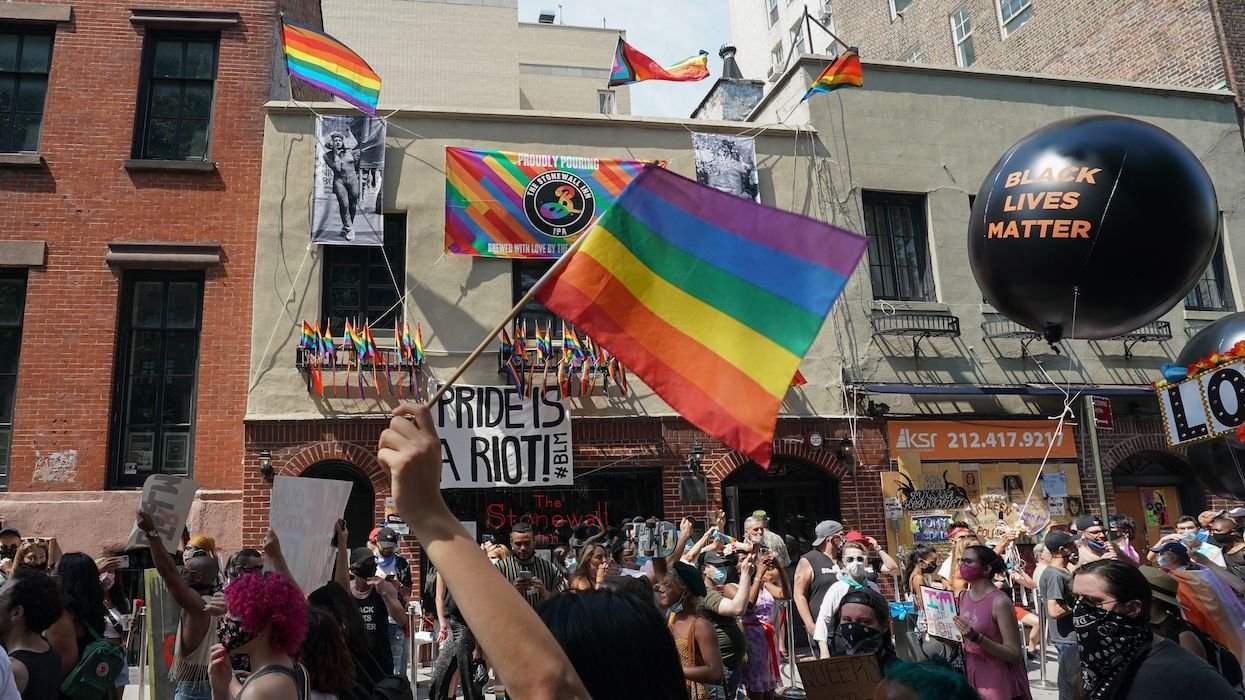During LGBTQ+ Pride Month, on June 26, we celebrated the 20th anniversary of the U.S. Supreme Court's landmark decision in Lawrence v. Texas, a Lambda Legal victory on behalf of John Lawrence and Tyron Garner. In Lawrence, the Court held that Texas’s Homosexual Conduct law, which made it a crime for two people of the same sex to have oral or anal sex, was unconstitutional. At that time 13 other states also had anti-sodomy laws.
During the HIV/AIDS epidemic, states went to their criminal codes once more to criminalize our existence rather than focus on the health care we needed. Such laws that targeted LGBTQ+ people invited police to surveil, harass, and abuse us. There comes a point when a people have to say “enough,” and it did at the Stonewall Inn and Compton’s Cafeteria.
While organizing had been happening for years, we often look at Stonewall as the start of our modern LGBTQ+ movement. Now, over 50 years later, we must not forget that the first Pride was a riot and protest against police abuse and violence. Lawrence continued that legacy by taking the fight to the courtroom. Each June, we recommit ourselves to battle for our lived equality. While we have made significant progress, our communities’ mere existence and day-to-day lives remain under attack, and those who seek to harm us are using criminal statutes to do so yet again. This year, we have faced a historic number of anti-LGBTQ+ bills; many, if enacted, would use the criminal legal system against us and those who support us.
Our organizations, Lambda Legal and Black and Pink National, were founded on the demand for liberation of LGBTQ+ people and everyone living with HIV. We are intimately familiar with the ways that government institutions, specifically the criminal legal system, continue to fail our communities and, as we’ve seen for generations, be used as a weapon to police, harass, and abuse our communities, especially those who are trans, Black and Indigenous, living with disabilities, and poor. That is why in 2022, Lambda Legal and Black and Pink National launched the Protected & Served? survey to hear directly from our community members.
The Protected & Served? 2022 report offers us a rare glimpse into the experiences of over 2,500 LGBTQ+ people and people living with HIV who have interacted with the criminal legal system. Among the findings are:
- Over half of the participants had face-to-face encounters with police in the past five years. These participants were less likely to trust the police than those who did not. And that number jumped dramatically for Black participants, two-thirds of whom reported having had contact with police in the same time period.
- Nearly half (49.7 percent) of sex workers experienced some form of police misconduct while working in this capacity: most commonly demanding money (25.9 percent) and demanding sex (17.6 percent).
- Abuse in detention is the norm, not the exception. An overwhelming majority (94.3 percent) of detained participants reported experiencing abuse such as sexual and physical assault in prisons and jails.
- In the courts, transgender participants of color were more likely to have their transgender status inappropriately revealed than white trans participants (38 percent vs. 22 percent). For transgender people, this could be a danger to their safety.
As a community, we should be outraged! It is urgent that we shine a light on the rampant discrimination and abuse in the criminal legal system. Everyone who interacts with the criminal legal system, including LGBTQ+ people and people living with HIV, must be treated fairly and their legal rights must be protected. Those government institutions and actors who are responsible for these harms must be held accountable. This requires a multifaceted approach that includes short- and long-term strategies and is led by those directly impacted.
We stand at the intersection of celebration and struggle — honoring the progress won such as Lawrence yet fiercely acknowledging the battles that still rage on. Our existence, rooted in authenticity, continues to endure in the face of criminalization, reminding the world that Pride is more than a parade — it's a testament to resilience and a demand for dignity and respect. As we fight against the tide of anti-LGBTQ+ laws, we remember that our first Pride was a riot, and we will not be silenced.
Richard Saenz is a senior attorney at Lambda Legal, the oldest and largest national legal organization whose mission is to achieve full recognition of the civil rights of lesbians, gay men, bisexuals, transgender people, and everyone living with HIV through impact litigation, education, and public policy work. He is also the project manager for Protected & Served?
Tatyana Moaton, Ph.D., MBA-HRM, is the executive director of Black and Pink National, a prison abolitionist organization dedicated to abolishing the criminal punishment system and liberating LGBTQIA2S+ people and people living with HIV or AIDS who are affected by that system through advocacy, support, and organizing.
Views expressed in The Advocate’s opinion articles are those of the writers and do not necessarily represent the views of The Advocate or our parent company, equalpride.















Charlie Kirk DID say stoning gay people was the 'perfect law' — and these other heinous quotes
These are some of his worst comments about LGBTQ+ people made by Charlie Kirk.